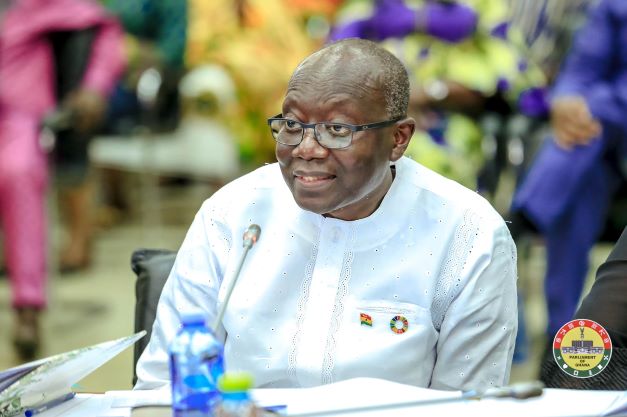Government is seeking overwhelming support of bond holders for the newly launched Domestic Debt Exchange programme since the success of what it calls necessary endeavour depends on the cooperation of the public.
Government is therefore soliciting the support of the media to disseminate the right information to economic actors.
The latest debt sustainability analysis had demonstrated that Ghana is faced with a significant financing gap over the coming years revealing that public debt is unsustainable.
4 legged approach
The debt restructuring which is expected to deal with high interest payments on the public debt is part of a four legged approach adopted by the government in 2023 budget aimed at alleviating the pressures on the national budget and restoring debt sustainability.
4 New Ghana bonds
Domestic debt operation involves an exchange for new Ghana bonds with a coupon that steps up to 10% as soon as 2025 (with a first interest payment in 2024) and longer average maturity.
Maturing dates for the new bonds
Existing domestic bonds as of December 1 2022 will be exchanged for a set of four new bonds maturing in 2027, 2029, 2032 and 2037.
Predetermined allocation ratios
Predetermined allocation ratios are 17% for the short bonds, 17% for the intermediate bond, 25% for the medium-term bond and 41% for the long-term bond.
Annual coupon rates
The annual coupon rates on all of these new bonds will be set at 0% in 2023, 5% in 2024 and 10% from 2025 until maturity. Coupon payments will be semi-annual.
Eligible holders, who deliver valid offers at or prior to the expiration date that are accepted by the country, will receive at the settlement date in exchange for their eligible bonds accepted, the same aggregate principal amount distributed across new bonds due dates.
Offers end on December 19
Offers may only be submitted starting from December 5, 2022, and ending at 4pm (Greenwich Mean Time (GMT)) on December 19, 2022.
Sole discretion to extend expiration date
However, government may at its sole discretion extend the expiration date, including for one or more series of eligible bonds.
Only registered holders eligible
The invitation is available only to registered holders of eligible bonds that are not individual investors or that are otherwise authorised by the Government of Ghana, in its sole discretion, to participate in the Invitation.
Government said eligible holders tendering their eligible bonds pursuant to the invitation will receive new bonds of the country on the terms and subject to the conditions described in the Exchange Memorandum.
All offers irrevocable
All offers to exchange eligible bonds made by eligible holders are irrevocable and by tendering their eligible bonds, eligible holders represented and warrant.
Such eligible bonds constitute all the eligible bonds owned by them and consent to the blocking by the Central Securities Depository of any attempt to transfer them prior to the settlement date or the termination of the invitation.
Launching the programme yesterday, Minister of Finance, Ken Ofori-Atta said government is targeting GH¢137 billion in domestic notes and bonds from domestic debt holders.
GH¢467.3bn public debt
These measures are expected to reduce the public debt which stood at GH¢467.3 billion (GH¢467,371.31 million) or the equivalent of $48.8 billion ($48,871.34 million) as at the end of September 2022.
Public is 75.9% to GDP
This represents approximately 75.9% of Gross Domestic Products (GDP) and the debt restructuring measures target to bring it down to 55% in the medium term.
Balance of payment support, new financing streams
When successful, the move will also open up financing streams and provide the needed balance of payment support from the International Monetary Fund (IMF).
Ofori-Atta debunked speculations that the government is about to cut their retirement savings or the notional value of their investments and appealed to Ghanaians to remove any doubt and discard such speculations.
He emphasized that government will take all appropriate measures to safeguard the solvency of the financial institutions involved in the Ghana’s domestic debt exchange.
Mr Ken Ofori-Atta, the Minister of Finance, said thanks to well-targeted regulatory measures and the creation of a Financial Stability Fund (FSF), banks, pension funds, insurance companies, fund managers, and collective investment schemes would be supported, to ensure that they meet their obligations to their clients as they fall due.
“We have also dialogued extensively with regulators across the Financial Sector including Securities and Exchange Commission, National Insurance Commission and National Pensions Regulatory Authority to agree that regulatory forbearance will be provided to all entities whose financial position is adversely affected by virtue of participating in this exchange,” he added.
Mr Ofori-Atta maintained that the objective of the programme is to alleviate the debt burden in a most transparent, efficient, and expedited manner.
He reiterated that government had been working hard to minimize the impact of the domestic debt exchange on investors holding government bonds.
The Minister revealed that the Debt Sustainability Analysis (DSA) had demonstrated that Ghana’s public debt was unsustainable, and that the government may not be able to fully service its debt down the road if no action was taken.
“Debt servicing is now absorbing more than half of total government revenues and almost 70% of tax revenues, while our total public debt stock, including that of State-Owned Enterprises and all, exceeds 100% of our GDP. This is why we are today announcing the debt exchange which will help in restoring our capacity to service debt,” Mr Ofori-Atta stated.
The move to restructure domestic debt, the minister noted is the path towards resetting the economy to a more stable one capable of addressing the development challenges of the country.
Mr Ofori-Atta gave the assurance that government is poised to bringing the economy back on track.
“As a government, we are determined to implement wide-ranging structural and fiscal reforms to restore fiscal and debt sustainability and support growth,” he stated.
The COVID-19 pandemic, rising global food prices, rising crude oil & energy prices; and the Russia-Ukraine war adversely affected Ghana’s macroeconomy, with spillovers to the financial sector.
The combination of adverse external shocks had exposed Ghana to a surge in inflation, a large exchange rate depreciation and stress on the financing of the budget, which taken together have put our public debt on an unsustainable path.
- Motorcycles killed 931 out of 2,276 road crash deaths in 2023 - 19 April 2024
- Friday April 19 2024 Newspaper Headlines - 19 April 2024
- Thursday April 18 2024 Newspaper Headlines - 18 April 2024




